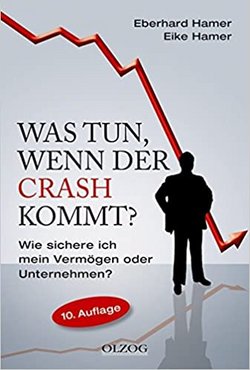Shares are not tangible assets
by Prof. Dr Eberhard Hamer

(Picture ma)
The financial sciences agree that the current unrestrained multiplication of money, credit multiplication and debt explosion must destroy the value of money in the medium or long term. Actually an inflation of 5 to 10 % should have occurred long ago. But so far it has been prevented with a worldwide counter policy (inflation backlog) by zero interest rates of the central banks, unrestrained financing of highly indebted states and companies by these very central banks and by “rescue packages” in the trillions, even by – according to the understanding of high finance – “perpetual loans” (Soros), which are never to be repaid.
At some point, however, like in a dammed river, masses of continuously inflowing water will wash over every dam. The same is true for the flooding of money and the inflation dam that has worked so far. We only know that eventually, the inflation backlog will no longer stay intact. We do not know when this will be the case.
At the latest when people realise how (their) money is being devaluated by multiplication, they will react: they will try to exchange their money for material assets, thereby increasing the velocity of circulation of money once again and in this way accelerating the inflation process ever more (up to a galloping inflation).
The real estate bubble and the stock market peaks as well as the rising gold price are already signs that clever investors are fleeing from money into tangible assets. Gold brings security, but no interest. The ongoing devaluation of money will therefore cause the price of gold to rise further – but only as a “flight currency”, not as a yield investment.
Real estate, on the other hand, is profitable (rents, leases). However, the currently exaggerated price bubble of real estate reduces this profitability. With prices meanwhile at twenty times the annual rent, the investment in real estate points more to an escape movement than to income-producing investment. In addition, the investor in residential property must expect our policies to not only put the brakes on rents, but also to introduce burden-sharing as soon as a crash bursts the money bubble and monetary assets melt away. It is true that in earlier currency reforms only 50 % of the value of real estate was devalued by burden-sharing, while money was devalued by 90 % – so it is still more profitable to stay in real estate than in money; but even the real estate investor will not get out of the coming debt correction unscathed – due to a would-be “justice”.The funds therefore recommend shares as the best investment. They refer to the fact that in inflation times the stock exchanges go up and aver that shares represent the real value of an enterprise.
Both these statements are superficially correct, but too narrowly considered:
- The rise of prices on the stock markets is not so much due to an increase in the value of the shares themselves as to the fact that a flood of liquidity is seeking real investments in the stock market, and this will in itself push up the prices of company shares. It is therefore not the value of the companies that is responsible for the price fireworks on our stock exchanges, but the excess liquidity of the money created by the central banks. The surplus money will first seek financial investments in the financial cycle and thus inflate stock market prices.
- The fact that rising stock market prices do not necessarily represent increases in the value of the corresponding companies is also related to the fact that in most cases prices are determined by speculation.
Take the example of Wirecard: the price fireworks of the worthless Wirecard was pure speculation; the bubble burst and left the investors as losers.
Or take the example of Tesla: Tesla is also likely to be a huge speculation bubble, but has so far only gained in price because it has become more and more gigantically indebted. This is not based on sustained economic strength, but on speculative investments and state subsidies (in Germany). Profits for the investors should not be expected. As soon as the bubble is discerned, the share price will collapse like a house of cards – and perhaps even the whole dummy company as well.
Take the example of start-ups: 90% of all start-ups fail. Yet few sectors of the economy currently carry as much hope as start-ups, as many reckless loans are invested in this hope and even more money will be burned in start-ups than in existing companies. The disillusionment will be short-term in the crisis that has already begun. - As far as stock market prices are concerned, it is also more a question of statements by central bank heads than of the value of companies. Positive hints from central bank governors generally make stock markets rise, negative ones make them fall. Positive company news, on the other hand, at best affects the share price of the company in question. Speculation focuses less on the value of individual companies than on changes in global financial data.
- The examples of digital companies and companies carrying out research on a corona vaccine show just how unrestrained international speculation is in its lust for share price opportunities. It is not company values that attract big business, but the speculative trend. Most digital companies have little or no real capital; all they have is hope. They therefore have no security of substance to offer, but only speculative hopes.
The times when our industrial sector worked with high investment capital and thus collected money from the stock markets for tangible assets (investment capital) are over. In the meantime, hope-inspiring companies collect most capital; they create speculative hope but no tangible assets for it. In this respect, the company shares today are less a material asset than a speculative value.
The author also knows from his own experience, how banks and corporations manipulate shares on the stock exchange according to their purposes. Investors do not realise this. They do not know that many a sensational report about a company only serves to sell its shares, or that some loss reports are only intended to manipulate the share price, so that these shares might be bought at a lower price. Investors do not know which price is manipulated by which company through legal (naked sales), illegal (insider trading) or semi-legal (cum-ex transactions).
Shares are therefore not only objects of speculation for major currency and financial movements as well as changes in the value of money, but in detail they are also objects of speculation for the profit manipulation of major shareholders and funds. Since 70% of our DAX shares are owned by international – mainly Anglo-Saxon – funds, these funds manipulate the share prices of their holdings for their own benefit, not according to firm value.
Even Donald Trump recognised this when he transferred two trillion dollars to Blackrock in the USA a few months ago, so that it might be used to manipulate stock market prices upwards against the danger of the economy crashing due to the corona virus.
Therefore, the financial sciences myth about shares being tangible assets is wrong. Shares are only speculative values. The material value of companies and even their profit prospects are secondary, and usually irrelevant for their shares’ market value.
So whoever believes that he can escape the disintegration of monetary value by buying shares will soon be forced to notice that in a crash the stock markets - like all financials, and unlike gold and real estate –0 fall apart, that the alleged material values of the stock market evaporate to perhaps 20% (as in 1930), that whoever banked on shares did not build on real value, but on quicksand.
It is not only our financial policy, with European debt assumption, debt explosion, “perpetual loans” and unrestrained money multiplication by the central banks, that is fraud; also the stock exchange, as a financial sector, is not secure in terms of real value, but is predominantly built on hope and fraud. If a greater number of investors realise this and sell, the stock bubble will collapse, the hope values will fall to the low real residual value of companies. Mind you, unlike bond investors, equity investors do not lose everything, but only almost everything. •
cc. Eberhard Hamer has been publishing, either as author or editor, for many decades much-read books on a variety of socio-political, while primarily focusing on economic and financial policy issues. The two books shown here are only a small selection: His volume “Visionen 2050” (ISBN 978-3-86445-332-8), published in 2016, presents the research results of various working groups. His “classic”, in which he was one of the few to predict the financial crisis of 2007/2008, is the book “Was tun, wenn der Crash kommt?” (What to do when the crash comes?), which was published in its 10th edition in 2008. (ISBN 978-3-7892-8261-4).

